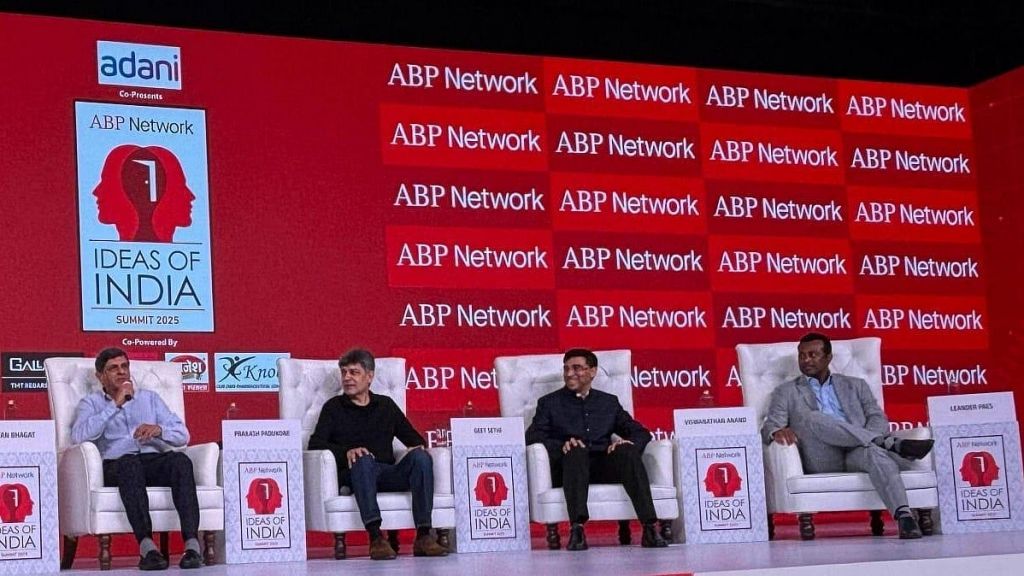
Indian tennis legend Leander Paes wears his sense of passion for the country and its sporting glory on his sleeves and it was all on display when he stated India has tremendous potential in sports and advocated for the use of sports science and DNA testing to assess young athletes.
The 1996 Atlanta Olympics bronze-medallist was speaking on the sidelines of ABP Network's Ideas of India Summit where he shared the stage alongside fellow Indian sporting greats such as the former All-England badminton champion Prakash Padukone, billiards legend Geet Sethi and five-time world chess champion Viswanathan Anand.
The Kolkata-born Paes turned a tad emotional while recollecting his initiation into tennis, followed by the struggles, challenges and glory beginning in the 1980s and through the 1990s.
“Being born to a Bengali mother and a Goan father, football was my first passion. I received an opportunity to join Barcelona at the age of 11, but I was asked to give up my Indian passport to continue playing football. My father laughed at me for six minutes because I chose tennis instead. I said, 'Give me 52 weeks in a tennis academy.”
“I realized in the first year of my parent’s separation that tennis is the only vehicle I had to become a man, which was written as the first and the last paragraph of the 100-page letter he had written for me.”
Paes elaborated on his thoughts on India's immense future potential as a sporting nation.
"I believe India has tremendous potential in sports, which can transform it into a powerhouse that enhances the quality of life, as well as the mental and emotional health of its people. We start scouting for talent quite late. As a nation, if we embrace sports science and incorporate DNA testing to assess young athletes whose abilities align with geographical genetics, I believe we can truly make a difference," he added.
Badminton legend Padukone emphasised on the importance of sports federations being involved
"We have abundant talent in the country, but many previously lacked opportunities. Over the last 15 years, this has changed significantly. The sports federations must be professionalized. Talent is not the issue, nor is funding a problem now. The government is doing its part, and people are receiving support, but it is crucial that sports federations become more involved. These federations need to operate like corporations. Federations control the sports. It is their responsibility to encourage and promote sports."
Anand felt India's way to winning Olympic medals was through the identifying the right talent and promoting them.
"In India, I work to identify talent and provide them with all the resources they need. Winning medals will inspire more people to take up sports as a career option. When sports become a mass movement in our country, that's when true transformation will happen. Currently, we are competitive in sports but often miss out narrowly. We shouldn’t be satisfied with these close misses; that's how we will grow as a sporting nation. In India, federations should be reformed to become more accommodating and spontaneous. Many chess players have started their own academies.”
Six-time World Billiards and Snooker champion Sethi, who is also the founder of Olympic Gold Quest (OGQ) program, had his own take on India's woeful Olympic performance over the years.
“The reason why we are not producing Olympic level sportspersons is that sports in India don’t have the money for the talent to be nurtured. Socioeconomics, genetics, and subconscious self-belief are the three things which will drive India to sporting excellence. Today, each member of the Olympic contingent is more confident which was not the case before.”
Sethi specified the sporting disciplines where India has realistic potential of fetching Olympic medals.
“We did a study and identified boxing, badminton, wrestling, archery, shooting as the sports that should be prioritised in India. We have no chance in athletics and aquatics," he added.
ABP Network's Ideas of India 2025, centred on the theme ‘Humanity’s Next Frontier,’ will bring together thought leaders and innovators to explore the challenges and opportunities in India’s ascendance in a rapidly changing world.